

Prospects for Japan as a middle power. Author: Yoshihide Soeya, Keio University After World War II Japan virtually stepped down from the stage of power politics and accepted that two documents would be the pillars of its foreign policy: its postwar Constitution (particularly the ‘pacifist clause’, Article 9) and the US-Japan security treaty.
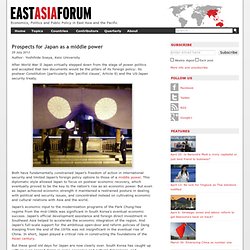
Both have fundamentally constrained Japan’s freedom of action in international security and limited Japan’s foreign policy options to those of a middle power. This diplomatic style allowed Japan to focus on postwar economic recovery, which eventually proved to be the key to the nation’s rise as an economic power. But even as Japan achieved economic strength it maintained a restrained posture in dealing with political and security issues, and concentrated instead on cultivating economic and cultural relations with Asia and the world. But these good old days for Japan are now clearly over. Some say that value-oriented diplomacy is the answer.
Okinawa: the Scotland of Asia? Some Okinawans feel they are in line for a shot at self-determination.
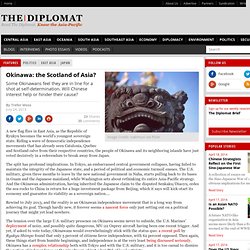
Will Chinese interest help or hinder their cause? A new flag flies in East Asia, as the Republic of Ryukyu becomes the world’s youngest sovereign state. Riding a wave of democratic independence movements that has already seen Catalonia, Quebec and Scotland calve from their respective countries, the people of Okinawa and its neighboring islands have just voted decisively in a referendum to break away from Japan. Rohingya Asylum Seekers in Need of a Regional Solution: Experts. Narunisa, a 25-year-old Rohingya woman, is comforted by her children and other people after returning to a shelter for Rohingya women and children in Phang Nga June 18, 2013.
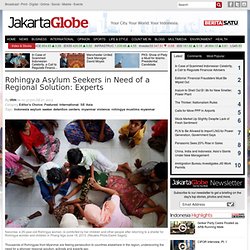
(Reuters Photo/Damir Sagolj) Thousands of Rohingyas from Myanmar are fleeing persecution to countries elsewhere in the region, underscoring the need for a stronger regional solution, activists and experts say. “A coordinated and immediate regional response will put pressure on the government to do more to ease the plight of the Rohingya people and prevent the situation from spiraling out of control,” Joey Dimaandal, a program associate for the South East Asia Committee for Advocacy (SEACA), a capacity building network for community-based organizations in Southeast Asia, told IRIN. More than 35,000 people have fled by boat over the past year, recent estimates suggest, while others believe the real number is much higher.
Others have made their way to India and Nepal, and even East Timor. Asean could do more Push-backs. The whole nine dashes and why the Philippines’ arbitration case against China is a bad idea. Author: Sourabh Gupta, Samuels International On 22 January 2013, the Philippines filed a Notification and Statement of Claim at the International Tribunal for the Law of the Sea (ITLOS), seeking to invalidate China’s nine-dash line which encompasses virtually the entire South China Sea.
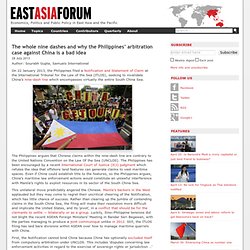
The Philippines argues that Chinese claims within the nine-dash line are contrary to the United Nations Convention on the Law Of the Sea (UNCLOS). The Philippines has been encouraged by a recent International Court of Justice (ICJ) judgment which refutes the idea that offshore land features can generate claims to vast maritime spaces. What the world should know about Myanmar’s regime change. Author: Nicholas Farrelly, ANU There is no one template for democratic change.
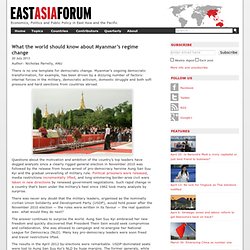
Myanmar’s ongoing democratic transformation, for example, has been driven by a dizzying number of factors: internal forces in the military, democratic activism, domestic struggle and both soft pressure and hard sanctions from countries abroad. A new power play: economic diplomacy and state autonomy in India. Author: Tridivesh Singh Maini, New Delhi.
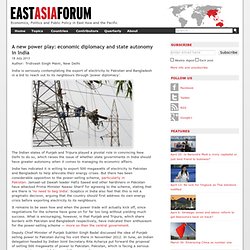
Chinese investment and aid in Cambodia a controversial affair. Author: Heng Pheakdey, EISD The China–Cambodia relationship has reached new peaks in recent years.
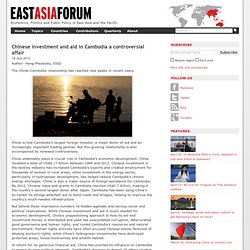
China is now Cambodia’s largest foreign investor, a major donor of aid and an increasingly important trading partner. But this growing relationship is also accompanied by renewed controversies. Why Chinese Obey. True, the state gains legitimacy from performance.
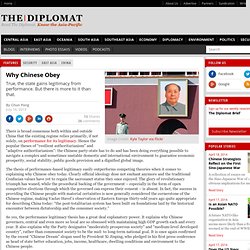
But there is more to it than that. By Chun Peng for The Diplomat July 16, 2013 Facebook3 Twitter2. As Asia rises, new challenges emerge. Author: Barry Desker, RSIS Analysts of global trends can easily get caught up in the hype of the rise of Asia.
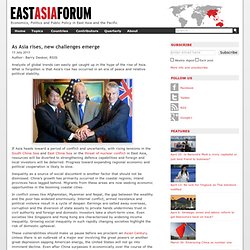
What is forgotten is that Asia’s rise has occurred in an era of peace and relative political stability. If Asia heads toward a period of conflict and uncertainty, with rising tensions in the South China Sea and East China Sea or the threat of nuclear conflict in East Asia, resources will be diverted to strengthening defence capabilities and foreign and local investors will be deterred. Progress toward expanding regional economic and political cooperation is likely to slow. Inequality as a source of social discontent is another factor that should not be dismissed. Has Snowden left international relations stuck in a transit lounge? Author: Sarah Logan, ANU At the time of writing, NSA leaker extraordinaire Edward Snowden sits (as far as we know) between immigration control points in Moscow airport.
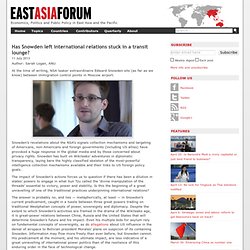
Eric X. Li: A tale of two political systems. Governing Mongolia. Reuters On June 26, 2013, Mongolians headed to the polls to vote in their sixth presidential election. The result was the re-election of incumbent Ts Elbegdorj, but barely. His 50.23 percent share of the nationwide popular vote means that he was a mere 3,000 votes away from at least having to face a run-off election against his main challenger. New challenges for Asia’s governments. Across the world, the role of government in the economy is expanding as a result of the implosion of credit markets and the subsequent sharp decline in economic activity, as well as concerns about social and political stability. In the West, this expansion has provoked a debate about whether it’s just a temporary response to great economic and financial turbulence or if it represents a discontinuity that will redefine government’s economic role in a significant and enduring way.
But in much of Asia, the intensity of the West’s debate on the role of government is hard to fathom. Big government hasn’t returned to Asia; it never left. Long before the current crisis, governments in fast-growing Asian economies such as Malaysia and Singapore routinely endeavored to shape economic outcomes by developing and implementing industrial policy, managing exchange rates, deploying reserves, and using state-owned assets. This pragmatism will be vital over the coming years. Shadow Puppets and Special Forces: Indonesia’s Fragile Democracy. Russia After Putin: Inherent Leadership Struggles. Editor's Note: This is the first part of a three-part series on Russia's leadership after President Vladimir Putin eventually leaves office. Part 1 revisits Putin's rise to power; Part 2 will examine Russia's demographics, energy sector and Putin's political changes; and Part 3 will explore whether the political systems Putin has built will survive him.
Russia has undergone a series of fundamental changes over the past year, with more changes on the horizon. Russia's economic model based on energy is being tested, the country's social and demographic make-up is shifting, and its political elites are aging. All this has led the Kremlin to begin asking how the country should be led once its unifying leader, Vladimir Putin, is gone. Already, a restructuring of the political elite is taking place, and hints of succession plans have emerged. A Difficult Land to Rule Without a heavy-handed leader, Russia struggles to maintain stability. Government for the People in China? Surveys belie claims that Chinese are becoming fed up with their government. By Wenfang Tang, Michael S. Lewis-Beck, and Nicholas F. US-China Economic Relations in the Next Decade (Complete) China's New Backyard - By R. Evan Ellis. For the past decade, Washington has looked with discomfort at China's growing interest in Latin America.
But while Beijing's diplomats bulked up on their Spanish and Portuguese, most U.S. policymakers slept soundly, confident that the United States still held a dominant position in the minds of its southern neighbors. In April 2005, the U.S. House of Representatives Subcommittee on the Western Hemisphere held a hearing on China's influence in the hemisphere and concluded that the U.S. position in the Western Hemisphere was much stronger than China's and, moreover, that Beijing's economic engagement in the region did not present a security threat. But that was 2005. In late May of this year, when U.S. GlobalAgendaOutlook_2013. Scenarios for the Russian Federation. Future of the Int'l Monetary System. Russia and the World in 2025. India and the World in 2025. China and the World in 2025. China and India, 2025: A Comparative Assessment.
19th International Conference on The Future of Asia. China Policy in a New Era. Recapping the dramatic Whitlam-Nixon openings to China of the 1970s—in which he participated—Ross Terrill’s new study finds fascinating themes for China policy today. Our Asia–Pacific region prospers, but the seas off China are not tranquil. American policies protect Australia, but they worry some Australians. Whitlam and Nixon cancelled decades of war in the Asia–Pacific, ushering in decades of astonishing economic growth for Australia, China and others. Can it last? Will the Chinese, who have much to lose from more war, accept give and take with Washington and Tokyo, or will the Middle Kingdom demand the middle position, squeezing its fourteen contiguous neighbours?